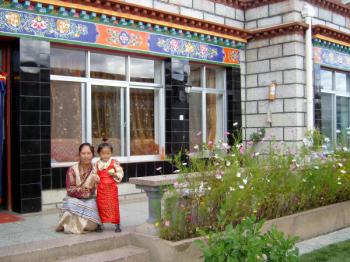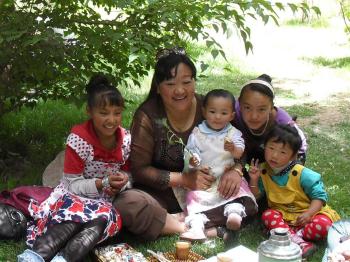Many children are at risk of losing parental care

Lhasa is located in the Himalayas. It is situated at 3,490 meters and is therefore one of the highest cities in the world. The economy of the region depends mostly on agriculture. The city is home to three UNESCO World Heritage sites, and although tourism is also a crucial aspect of the city's economy, the number of visitors varies depending on the political climate.
In recent decades the infrastructure has been improved and the region has been better connected to the rest of China. However, according to most human development indicators, Tibet, autonomous region of China continues to rank amongst the lowest in the Chinese context. Literacy and life expectancy are low and the disparities between those living in rural areas and those in urban areas are high.
The city of Lhasa itself faces particular issues. As an increasing number of people have moved here, the city has struggled to accommodate them and provide them with adequate infrastructure and services. The price of basic commodities and food has also increased recently.
Children have been amongst the first to suffer the consequences of the economic and social changes that Tibet has experienced in the past decades. Many parents struggle to meet their children's basic material and emotional needs. Some children are left in the care of relatives or acquaintances while the parents go abroad in search of better opportunities. Other parents decide that it is best to send their children to one of the neighbouring countries where the children can be taken care of by the Tibetan communities there.
Protecting the rights of children
What we do in Lhasa

In addition to protecting the rights of children at a national level, SOS Children's Villages is active in protecting children at a local level in Lhasa. Children who can no longer live with their families can find a loving home in one of the 17 SOS families. The children grow up with their sisters and brothers in a familial environment full of love, respect and security. The children from the SOS families attend the local schools, and those who need it receive support with their school work. They participate in local singing and sports competitions which help their integration into the community.
The SOS Kindergarten, which was opened in 2002, looks after children from both SOS families and from the community. The provision of day-care is particularly valued by those parents who go to work – they know their children are being cared for by professionals.
As the children grow older they can join the SOS Youth Programme. With the support of qualified professionals, the young people develop perspectives for their future, learn to shoulder responsibility and increasingly make their own decisions. They are encouraged to develop team spirit and build up contacts with relatives and friends, as well as with the relevant authorities and potential employers.